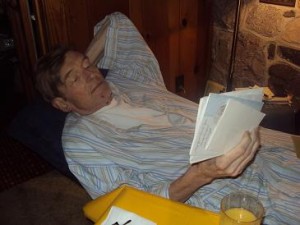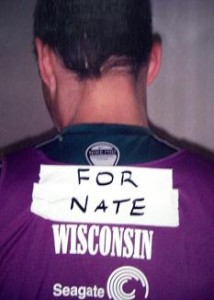Most people want to know what’s in their future. Some pay fortune tellers to find out. Others read palms, tea leaves and crystal balls. But is it a good thing to know?
As Nate and I moved to Michigan in June, we had no idea what was coming in September, the month we got his cancer diagnosis. Even in September, we had no idea he’d be leaving for heaven by early November. Today, I have no knowledge of what’s going to happen tomorrow.
How would Nate and I have done things differently, had we known there would be only 42 days from his diagnosis to his death? Would we have rushed off to do some fun things before he was too infirm to want that? Would we have invited a string of friends to visit before he was unable to tolerate the stress of company? Would we have eaten more chocolate? Fixed lobster for dinner? Visited Europe? Maybe, but probably not.

What if Van’s Medical Supply had pulled their truck up to our door and unloaded all 21 pieces of hospital-type equipment at once? We would have had a major look into our future, and it wouldn’t have been good. I am thankful we didn’t know. Taking health steps downward one at a time was better than leaping down the whole staircase at once.
Another fact I was glad I didn’t know ahead of time was that I would have to keep track of 38 different bottles of medicine along with their dose amounts and times to give them. I’d have said, “If that’s my future, I can’t handle it.” But as the prescriptions increased, my ability to manage them increased, too, beyond my natural ability. God was one step ahead of me, equipping me to meet the need.
I didn’t worry about it beforehand, because I didn’t know it was coming. Now, with Nate gone and his medicines too, the old me, the ditz who can’t do numbers, is back. Balancing my checkbook is hard again, and I look back in wonder at how God prepared me for that numbers task that once was in my future and now is in my past.
How about my life as a widow? Would I want to know ahead of time exactly how that’s going to go? Only an idiot would say “yes” to that. I know there will be challenges greater than I’ve yet experienced in 64 years but don’t know what they’ll be. Not knowing, I don’t have to worry or fret.
The beautiful thing about God caring for me is that he’ll ready me for the tough stuff that’s coming before it gets here. I picture him walking ahead with a big machete, slashing away every obstacle in my path before I get there. I’ll be able to put one foot in front of the other without falling because of his provision for my future.
Some may desire to know what their “fates” will be. Not me. I’d rather claim “the full-circle verses,” the ones that describe how God is literally all around me and my future. After that, it’s easy to leave everything up to him:
“The Lord will go before you, and the God of Israel will be your rear guard.” (Isaiah 52:12)
“As the mountains surround Jerusalem, so the Lord surrounds his people, from this time forth and forever.” (Psalm 125:2)
“The Lord will cover you with his pinions, and under his wings you may seek refuge.” (Psalm 91:4)
“The Lord is the one who goes ahead of you. He will not fail you or forsake you. Do not fear or be dismayed.” (Deuteronomy 31:8)
“You have enclosed me behind and before, and laid your hand upon me.” (Psalm 139:5)

